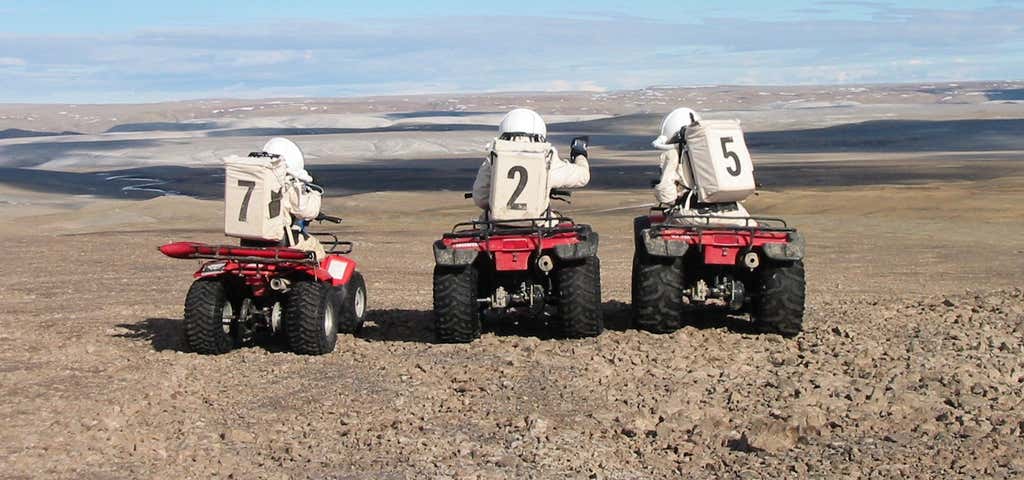“Visit the surface of Mars... without leaving the planet!”
The Flashline Mars Arctic Research Station (FMARS) is the first of two simulated Mars habitats (or Mars Analog Research Stations) established and maintained by the Mars Society. The station is located on Devon Island, a Mars analog environment and polar desert, approximately 165 kilometres north east of the hamlet of Resolute in Nunavut, Canada. The station is situated on Haynes Ridge, overlooking the Haughton impact crater, a 23 km diameter crater formed approximately 39 million years ago (late Eocene). The location is approximately 1,609 km from the Geographic North Pole and approximately 1,287 km from the Magnetic North Pole. FMARS is the first research station of its kind to be built, completed in the summer of 2000. Operated by the non-profit Mars Society, the station's mission is to help develop key knowledge needed to prepare for human Mars exploration, and to inspire the public by making real the vision of human exploration of Mars. The society uses the station to conduct geological and biological exploration under conditions similar to those found on Mars, to develop field tactics based on those explorations, to test habitat design features, tools, and technologies, and to assess crew selection protocols. The project's final cost was US $1.3 million, raised through sponsorships with major companies. Flashline.com, an internet business, donated $175,000 and was granted the right to affix its name to the project. Other major sponsors included the Kirsch Foundation, the Foundation for the International Non-governmental Development of Space (FINDS) and the Discovery Channel (which purchased exclusive English-language TV rights to the station's activities for the first two years). The Mars Society sends researchers to live and work at the station typically for one month during the arctic summer. Each of these expeditions consists of a crew of between 6 and 7 individuals. Typically 1 to 2 months prior to departing for the Canadian Arctic, the crew gathers for an initial face-to-face meeting and training session in Colorado. Departing for the arctic, the crew travels by commercial airline to Resolute. There they spend a few days at the South Camp Inn, organizing their supplies and equipment and conducting some final training while waiting for clear weather. They then board Twin Otter aircraft for the final leg of the journey. These aircraft land on a dirt airstrip located on Devon Island near the station. The primary means of crew transportation while on the island is by All-Terrain Vehicles (ATVs). During the formal Mars simulation period of each expedition, it is required that any outside work be done while wearing a simulated spacesuit and that all communications are conducted by radio. Space suited crew members use a simulated airlock depress/repress procedure upon each exit and entry to the habitat. Communications between the station and off-island researchers are subject to a time delay (typically 20 minutes) which mimics that of actual radio traffic between Earth and Mars. A satellite phone is kept on-site for use in emergencies. Due to limited visibility of crew members wearing simulated spacesuits, all work outside the station is conducted with one crew member "out-of-sim". It is the responsibility of this crew member be on look out for, and to protect the crew from, polar bears. This crew member is typically armed with a pump-action shotgun loaded with slugs. The crew also carries bear deterrent devices known as bear bangers. No polar bears have yet been encountered by the crew of an FMARS expedition, although signs of their presence on the island are regularly seen, and at least one encounter has occurred with participants in the HMP. Crew members are also required to write periodic reports to document conducted research, to advise on the status of engineering systems, and to capture details related to other aspects of operations. There are four reports that are typically generated, these being the Commander's Report, a Science Report, an Engineering Report and a Narrative Report. The crew transmits these reports to a Mission Support team (typically located in Colorado).
Be the first to add a review to the Flashline Mars Arctic Research Station.
/-89.823386,75.431319,14/300x172@2x?access_token=pk.eyJ1Ijoicm9hZHRyaXBwZXJzIiwiYSI6ImNsdjQ5N2VtZDA2bW8ycW13ZHAxeGhjbjkifQ.UIccpoAxc7g3BAuK4s9vjg)
Flashline Mars Arctic Research Station
Hours
Problem with this listing? Let us know.
Has RV parking changed? Let us know.
-
Parking
-
Pets Allowed
-
Restrooms
-
Wifi
-
Wheelchair Accessible
-
Credit Cards Accepted
